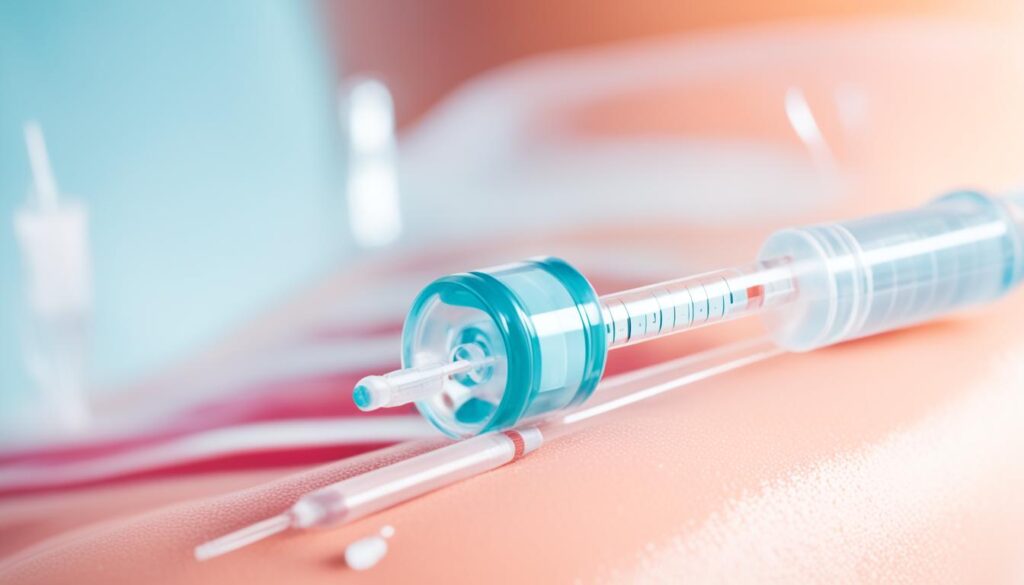Everyone knows that pregnancy is a time of immense joy and anticipation for expecting mothers. However, what many may not be aware of is the significant impact that HCG injections can have on pregnant women. HCG injections, also known as human chorionic gonadotropin, are commonly used in fertility treatments to stimulate ovulation or support pregnancy. But did you know that the effects of HCG injections go beyond fertility?
Studies have shown that HCG injections during pregnancy can affect both maternal health and fetal development in remarkable ways. From ensuring proper progesterone production to promoting the growth of blood vessels in the uterus, HCG plays a vital role in maintaining a healthy pregnancy. But what about the safety considerations? Are there any risks involved? And what benefits can pregnant women expect from HCG injections?
In this comprehensive guide, we will delve into the impact of HCG injections on pregnant women and explore important factors such as safety, potential side effects, administration methods, alternatives, and more. Whether you’re considering HCG injections as part of your fertility treatment or simply want to expand your knowledge on the subject, this article will provide you with the essential information you need to make informed decisions for yourself and your baby.
Key Takeaways:
- HCG injections have a significant impact on maternal health and fetal development during pregnancy.
- They are commonly used in fertility treatments to stimulate ovulation or support pregnancy.
- Safety considerations, potential side effects, and proper administration methods are crucial to ensure the well-being of pregnant women.
- Exploring alternatives and discussing individual circumstances with a healthcare provider is important before considering HCG injections.
- Understanding the role of HCG hormone in pregnancy can help in making informed decisions regarding its use.
What is HCG and how is it used?
HCG, or human chorionic gonadotropin, is a hormone used for various purposes in both men and women. In women, HCG is commonly used in conjunction with other fertility drugs to enhance the chances of pregnancy. In men and adolescent boys, HCG assists with testosterone and sperm production. It is also employed in male children with cryptorchidism, a condition affecting the testes. HCG injections can be administered into a muscle or subcutaneously, depending on the healthcare provider’s recommendation. Popular brand names for HCG injections include Novarel, Ovidrel, and Pregnyl.
When it comes to women, HCG injections are often prescribed in combination with other fertility drugs to stimulate ovulation and increase the chances of achieving a successful pregnancy. These injections work by mimicking the action of luteinizing hormone (LH), which is responsible for triggering the release of eggs from the ovaries.
In men and adolescent boys, HCG injections are utilized for two primary purposes. Firstly, they support testosterone production, which is crucial for maintaining male reproductive function, energy levels, and overall well-being. Secondly, HCG injections assist with sperm production, thereby helping individuals with fertility issues.
In male children with cryptorchidism, which is the failure of one or both testicles to descend into the scrotum, HCG injections are used to stimulate testicular descent. By encouraging the testicles to move into the scrotum, HCG injections can help prevent complications and improve future reproductive health.
Understanding the various applications of HCG hormone is crucial in optimizing reproductive health and addressing fertility concerns in both men and women.
Safety considerations before taking HCG injections

Safety is a crucial consideration before starting HCG injections. It is important to inform the healthcare provider about any pre-existing medical conditions to ensure the safe administration of HCG injections. Conditions such as asthma, ovarian cysts, heart disease, migraines, kidney disease, cancer, seizures, or allergies to HCG or other hormones, medicines, foods, dyes, or preservatives should be disclosed to the healthcare provider. This information allows the healthcare provider to determine whether HCG injections are appropriate for the individual and to make any necessary adjustments to the treatment plan.
“It is important to consider potential risks and benefits, especially for pregnant women.”
During pregnancy, HCG injections should not be used. If pregnancy is a possibility, it is vital to disclose this information to the healthcare provider to avoid any potential risks to the developing fetus. Additionally, if breastfeeding, it is crucial to inform the healthcare provider as HCG injections can potentially pass into breast milk and affect the nursing baby. The healthcare provider can advise on the appropriate course of action in such cases.
Once the decision is made to proceed with HCG injections, it is essential to follow the prescribed dosage and administration instructions provided. This ensures the safe and effective use of the medication. Any concerns or adverse reactions that arise should be promptly reported to a healthcare professional for further evaluation and guidance. It is always better to seek medical advice in case of uncertainty or if any unexpected symptoms occur.
“It is paramount to prioritize safety and consult with a healthcare professional throughout the process.”
How to use HCG injections during pregnancy
When using HCG injections during pregnancy, it is important to follow proper administration guidelines to ensure safe and effective treatment. The method of administration, dosage, and disposal of needles should be carefully considered. Here are some key factors to keep in mind:
Administration Method
HCG injections can be administered via either a muscle injection or a subcutaneous injection. The specific method of administration will depend on the treatment plan recommended by your healthcare provider. It is important to follow their instructions and guidance to ensure correct administration and optimal results.
Dosage and Prescription Label
The dosage of HCG injections will be determined by your healthcare provider based on your specific needs and response to treatment. It is vital to follow the dosage instructions specified on the prescription label. This includes the frequency and timing of injections. Proper adherence to the prescribed dosage is essential for the success of fertility treatment.
Sharps Container
Used needles and syringes should be disposed of properly to prevent accidental injury. It is recommended to use a designated sharps container for safe disposal. Sharps containers are designed to securely collect used needles, syringes, and other sharps, ensuring they are properly contained and not accessible to others.
Children and Missed Dose
If HCG injections are prescribed for children, it is important to discuss appropriate administration techniques and precautions with your healthcare provider. They can provide guidance tailored to the needs of pediatric patients. Additionally, it is crucial not to miss any doses of HCG injections, especially when undergoing fertility treatment. Consistent and accurate administration is key to increasing the success of the treatment.
| Administration Guidelines | Key Considerations |
|---|---|
| Method of Administration | Muscle injection or subcutaneous injection |
| Dosage and Prescription Label | Follow prescribed dosage and instructions on the label |
| Sharps Container | Properly dispose of used needles and syringes in a sharps container |
| Children and Missed Dose | Discuss administration and precautions for children; avoid missing any doses |
By following these guidelines and consulting with your healthcare provider, you can ensure the proper administration of HCG injections during pregnancy. It is important to prioritize safety, adhere to prescribed dosages, and take necessary precautions to maximize the success of fertility treatment.
Interactions with HCG injections

When considering the use of HCG injections, it is important to be aware of potential interactions with other substances. Certain herbal or dietary supplements, medications, smoking, alcohol, and illegal drugs can affect the effectiveness and safety of HCG injections. To ensure optimal outcomes and minimize potential risks, it is crucial to discuss all medications and supplements with your healthcare provider. Here are some substances that may interact with HCG injections:
Herbal Supplements
Herbal supplements such as blue cohosh, black cohosh, and chasteberry may interact with HCG injections. These supplements can have hormonal effects and may interfere with the mechanism of action of HCG. It is essential to disclose all herbal supplements you are taking to your healthcare provider.
Medications
Certain medications may interact with HCG injections. It is important to inform your healthcare provider about all prescription and over-the-counter medications you are taking, as well as any previous or ongoing treatments. Your healthcare provider can guide you on the safety and potential interactions between HCG injections and specific medications.
Smoking, Alcohol, and Illegal Drugs
Smoking, alcohol consumption, and the use of illegal drugs can also impact the effectiveness of HCG injections. These substances may interfere with hormonal balance and fertility. It is crucial to discuss your lifestyle choices with your healthcare provider, as they can offer guidance on minimizing potential risks and optimizing the outcomes of HCG injections.
By providing complete and accurate information about your supplement use, medications, and lifestyle choices, you and your healthcare provider can work together to ensure the safe and effective use of HCG injections.
Monitoring and precautions while using HCG injections
Close monitoring by a doctor is necessary when using HCG injections to ensure the safety and well-being of the patient. This monitoring includes various assessments to track treatment progress and address any potential concerns. The following measures are typically employed:
- Doctor Monitoring: A healthcare provider will closely monitor the patient throughout the course of HCG injections to assess the response to treatment and make any necessary adjustments. Regular check-ups and consultations are scheduled to ensure the patient’s overall health and safety.
- Urine Samples: Collecting urine samples helps determine the effectiveness of HCG injections and monitor hormone levels. These samples offer valuable insights into the progress of the treatment and help the doctor assess the patient’s response.
- Blood Tests: Regular blood tests are conducted to measure hormone levels and evaluate the impact of HCG injections on the body. These tests provide important data that helps guide treatment decisions and ensure appropriate dosing.
- Ultrasound Exams: Ultrasound exams may be performed to assess the development of the reproductive organs and monitor the growth of follicles in the ovaries. These exams allow the doctor to visualize the progress of the treatment and make any necessary adjustments.
- Pregnancy Detection: If pregnancy is suspected or detected while using HCG injections, it is essential to inform the doctor immediately. This information helps the healthcare provider modify the treatment plan accordingly and ensure appropriate care for both the mother and the developing fetus.
Additionally, healthcare providers may recommend certain precautions to optimize the effectiveness of HCG injections and promote overall well-being. These precautions include:
- Limiting Alcohol Consumption: Alcohol intake may interfere with the effectiveness of HCG injections and negatively impact fertility. Healthcare providers often advise patients to limit or avoid alcohol consumption during fertility treatments.
- Reducing Tobacco Use: Smoking can have detrimental effects on fertility and overall health. Healthcare professionals may recommend reducing or quitting tobacco use to maximize the chances of successful treatment and ensure optimal maternal and fetal health.
By closely monitoring the patient’s progress through urine samples, blood tests, and ultrasound exams, and by implementing necessary precautions such as limiting alcohol consumption and reducing tobacco use, healthcare providers can ensure the safe and effective use of HCG injections for fertility treatment. Continual monitoring and adherence to guidelines are key to successful outcomes and the well-being of both the mother and the developing fetus.
| Monitoring Measures | Benefits |
|---|---|
| Doctor Monitoring | Ensures appropriate and timely adjustments to treatment plan based on individual response |
| Urine Samples | Provides valuable insights into hormone levels and treatment progress |
| Blood Tests | Evaluates hormone levels and guides treatment decisions |
| Ultrasound Exams | Visualizes reproductive organ development and monitors follicle growth |
| Pregnancy Detection | Facilitates appropriate adjustments to the treatment plan if pregnancy is suspected or detected |
Quote:
“Proper monitoring and precautions are essential when using HCG injections to ensure patient safety and well-being. Regular check-ups, urine samples, blood tests, ultrasound exams, and pregnancy detection provide valuable information for optimizing treatment and addressing any concerns.”
Potential side effects of HCG injections in pregnant women
HCG injections, while generally safe and beneficial during pregnancy, can have potential side effects that women should be aware of. It is important to note that not all women will experience these side effects, and their severity may vary. However, if any of these side effects occur, it is advisable to consult with a healthcare professional for further evaluation and guidance.
- Allergic reactions: Although rare, some women may develop an allergic reaction to HCG injections. Signs of an allergic reaction may include rashes, itching, swelling, or difficulty breathing. If any allergic reactions occur, medical attention should be sought immediately.
- Breathing problems: In some cases, pregnant women may experience difficulties with breathing or shortness of breath after receiving HCG injections. If these symptoms persist or worsen, it is important to consult with a healthcare professional to determine the cause and appropriate treatment.
- Breast and genital enlargement: HCG injections may cause temporary breast and genital enlargement due to hormonal changes. This side effect typically resolves on its own after pregnancy, but if any concerns arise, a healthcare provider should be consulted.
- Nausea and vomiting: Some pregnant women may experience nausea and vomiting as a side effect of HCG injections. This can be managed with lifestyle changes and medication under the guidance of a healthcare professional.
- Pelvic pain and bloating: HCG injections may cause pelvic pain and bloating in pregnant women. These symptoms are usually mild and temporary, but if they persist or become severe, medical advice should be sought.
- Weight gain: It is not uncommon for women to experience weight gain while receiving HCG injections. This weight gain is typically due to fluid retention and hormonal changes. If weight gain becomes excessive or is a cause for concern, it is important to consult with a healthcare professional.
- Urinary issues: Some pregnant women may experience urinary issues, such as increased frequency or difficulty urinating, as a side effect of HCG injections. If these symptoms become bothersome or persistent, it is advisable to seek medical guidance.
- Acne: HCG injections may contribute to the development of acne in some pregnant women. Proper skincare and consultation with a dermatologist can help manage this side effect.
- Emotional changes: Hormonal changes caused by HCG injections can sometimes lead to emotional changes, including mood swings or increased sensitivity. If these emotional changes become overwhelming or interfere with daily life, it is important to seek support from a healthcare professional.
- Headache: Headaches can occur as a side effect of HCG injections in pregnant women. If headaches are persistent or severe, it is advisable to consult with a healthcare professional for appropriate management.
- Injection site pain: Mild pain or discomfort at the injection site is a common side effect of HCG injections. If the pain persists or becomes severe, it is recommended to consult with a healthcare professional.
It is important to remember that the benefits of HCG injections in pregnant women often outweigh the potential side effects. However, close monitoring by a healthcare professional is essential to ensure the well-being of both the mother and the developing fetus. If any concerns or questions arise, it is always best to consult with a healthcare professional for personalized advice and guidance.
Storing and disposing of HCG medication

When it comes to HCG medication, proper storage and disposal are crucial to ensure safety and efficacy. Here are some important guidelines to follow:
Storage:
To maintain the integrity of HCG medication, it’s essential to store it appropriately. Take note of the following recommendations:
- Keep out of reach: Store HCG medication in a secure location that is out of reach from children and pets.
- Avoid extreme temperatures: Keep the medication away from direct sunlight, high heat, and freezing temperatures.
- Check the expiration date: Always monitor the expiration date of the medication and discard it if it has expired.
Disposal:
Proper disposal of HCG medication and related items is crucial to prevent accidental ingestion or misuse. Follow these recommendations:
- Use a sharps container: For the safe disposal of used needles and syringes, it is recommended to use a sharps container. These containers are specifically designed to minimize the risk of needlestick injuries.
- Consult healthcare provider: If a sharps container is not available, it is advisable to reach out to a pharmacist or healthcare provider for guidance on proper disposal methods in your area.
- Unused medication: Unused HCG medication should be disposed of after the expiration date. Avoid keeping or using expired medication, as it may not be effective or safe.
By storing and disposing of HCG medication properly, you can help prevent unintended harm and ensure the medication remains safe and effective.
The role of hCG hormone in pregnancy
The hCG hormone plays a crucial role in pregnancy. Its primary function is to promote the production of progesterone by the ovaries until the placenta is established. Progesterone is essential for maintaining a healthy pregnancy, protecting the uterine lining, and supporting fetal development.
During early pregnancy, hCG helps in the development of the embryo, providing essential signals for its growth and implantation in the uterine lining. This hormone also ensures the maintenance of the pregnancy by supporting the development and function of the placenta.
Additionally, hCG contributes to the development of blood vessels in the uterus, ensuring adequate nutrients and oxygen supply to the developing fetus. It also plays a role in the smoothness of uterine muscle cells, allowing for proper contractions during labor and delivery.
Understanding the role of the hCG hormone in pregnancy is important for comprehending its impact on maternal health and fetal development. By promoting progesterone production, aiding in embryo development, supporting the uterine lining, and contributing to pregnancy maintenance, hCG is vital for a healthy and successful pregnancy.
The use of hCG injections in infertility treatment

When it comes to infertility treatment, hCG injections play a vital role in stimulating ovulation and increasing the chances of conception. These injections are particularly beneficial for individuals who have difficulties getting pregnant due to issues with ovulation. Acting similarly to luteinizing hormone (LH), which controls ovulation, hCG injections trigger the release of eggs from the ovaries.
Timing intercourse during the fertile window is essential for successful conception. By administering hCG injections and accurately timing intercourse, couples undergoing infertility treatment can optimize their chances of getting pregnant.
In addition to stimulating ovulation, hCG injections are also utilized in in vitro fertilization (IVF) cycles. Often referred to as “trigger shots,” these injections are administered to precisely time the retrieval of mature eggs from the follicles. This ensures that eggs are released at the most opportune moment for fertilization during the IVF process.
By incorporating hCG injections into infertility treatment, couples can greatly enhance their chances of achieving pregnancy. The ability to stimulate ovulation and carefully time intercourse or egg retrieval in an IVF cycle significantly improves the success rates of fertility treatments.
Considerations and alternatives to HCG injections
Before considering HCG injections, it is important to explore other options and alternatives that can address underlying fertility issues and optimize hormone health. One such alternative is progesterone supplementation, which can contribute to the prevention of miscarriages.
Progesterone Supplements: Progesterone, another hormone that plays a crucial role in pregnancy, may be prescribed to support early pregnancy and reduce the risk of miscarriages. Progesterone supplements can help maintain the uterine lining and support fetal development.
HCG Supplements: While there may be HCG supplements available on the market, it is essential to note that they are not approved for use without a prescription. HCG supplements are typically prescribed as part of infertility treatment to stimulate ovulation or support pregnancy.
Tracking hCG Levels: Tracking hCG levels through blood tests or fertility tracking systems can provide valuable information about fetal development and pregnancy health. Monitoring hCG levels allows healthcare providers to assess the progress of pregnancy and ensure appropriate interventions if needed.
“Exploring alternatives and considering individual circumstances can help determine the most appropriate course of action.”
By considering these alternatives and tracking hCG levels, individuals can make more informed decisions regarding their fertility treatment options. It is crucial to consult with a healthcare provider to discuss these options, address any concerns, and determine the best approach for each individual’s specific needs.
| Considerations and Alternatives to HCG Injections |
|---|
| Progesterone Supplementation |
| HCG Supplements |
| Tracking hCG Levels |
Conclusion
In conclusion, the use of HCG injections during pregnancy requires careful consideration and monitoring. Safety considerations and awareness of potential side effects are paramount to ensure the well-being of both the mother and the fetus. It is essential to consult with a healthcare provider before embarking on HCG injections and address any concerns or questions that may arise.
While HCG injections can be beneficial for fertility treatments and ovulation stimulation, exploring alternatives and understanding individual circumstances are important factors in making informed decisions. Discussing progesterone supplementation with a healthcare provider can be a viable alternative for miscarriage prevention and hormone health optimization.
Proper monitoring, including blood tests and ultrasound exams, is necessary to track treatment progress and ensure the effectiveness of HCG injections. It is crucial to be aware of potential side effects such as enlarged breasts, nausea, pelvic pain, or weight gain and promptly seek medical attention if any concerns arise.
By considering safety considerations, exploring alternatives, and engaging in proper monitoring, individuals can make informed decisions and take the necessary steps to ensure a safe and healthy pregnancy.
FAQ
What is the impact of HCG injections on pregnant women?
HCG injections play a crucial role in supporting a pregnancy by promoting progesterone production and aiding in fetal development. However, it is important to consider the safety, potential risks, and benefits of HCG injections for pregnant women and their impact on maternal health. Consulting with a healthcare provider is advised.
What is HCG and how is it used?
HCG, or human chorionic gonadotropin, is a hormone used for various purposes in men and women. In women, HCG is commonly used in fertility treatment to stimulate ovulation. In men, it helps with testosterone and sperm production. HCG injections can be administered into a muscle or under the skin and are available under brand names such as Novarel, Ovidrel, and Pregnyl.
What safety considerations should be taken before taking HCG injections during pregnancy?
Safety is crucial when considering HCG injections during pregnancy. It is important to inform the healthcare provider about any pre-existing medical conditions, allergies, or medications. HCG injections should not be used during pregnancy, and it is important to disclose if breastfeeding. Consulting with a healthcare provider is essential to assess the individual’s specific circumstances.
How should HCG injections be used during pregnancy?
HCG injections can be administered via muscle injection or subcutaneous injection, depending on the treatment plan specified by the healthcare provider. It is important to follow the prescribed dosage and administration instructions, as well as proper disposal of used needles and syringes in a sharps container. If HCG injections are prescribed for children, appropriate precautions should be discussed with the healthcare provider.
What interactions should I be aware of when using HCG injections?
HCG injections can interact with certain substances, including herbal or dietary supplements and certain medications. It is important to inform the healthcare provider about all medications, supplements, and substances being used. These interactions may affect the effectiveness and safety of HCG injections and should be discussed with a healthcare provider.
What monitoring and precautions should be taken while using HCG injections?
Close monitoring by a doctor is necessary when using HCG injections. This may involve urine samples, blood tests, or ultrasound exams to track treatment progress and ensure the well-being of the patient. If pregnancy is detected or suspected, it is important to inform the doctor. Additionally, healthcare providers may recommend limiting alcohol consumption and reducing tobacco use during fertility treatments.
What are the potential side effects of HCG injections in pregnant women?
HCG injections may have potential side effects in pregnant women, including allergic reactions, breathing problems, breast or genital enlargement, nausea, vomiting, pelvic pain, bloating, weight gain, urinary issues, acne, emotional changes, headache, or pain at the injection site. If any concerns arise, it is advisable to consult with a healthcare professional for further evaluation and guidance.
How should HCG medication be stored and disposed of?
HCG medication should be stored out of the reach of children and properly disposed of after the expiration date. It is recommended to use a sharps container for the disposal of used needles and syringes. If a sharps container is not available, contacting a pharmacist or healthcare provider is advised to obtain one.
What is the role of the hCG hormone in pregnancy?
The hCG hormone plays a crucial role in pregnancy by promoting progesterone production, supporting the development of blood vessels in the uterus, and contributing to the development of uterine muscle cells. Progesterone is essential for maintaining a healthy pregnancy, protecting the uterine lining, and supporting fetal development.
How are hCG injections used in infertility treatment?
HCG injections are commonly used in infertility treatment to stimulate ovulation. They can increase the chances of successful conception by triggering ovulation and timing intercourse during the fertile window. HCG injections may also be used to time egg retrievals in an IVF cycle. Close monitoring and guidance from a healthcare provider are necessary during the use of hCG injections for infertility treatment.
What considerations and alternatives should be considered before using HCG injections?
Before considering HCG injections, it is important to explore other options and alternatives. This may include addressing underlying fertility issues, optimizing hormone health, or considering progesterone supplementation for the prevention of miscarriages. HCG supplements are not approved for use without a prescription and are only prescribed as part of infertility treatment. Tracking hCG levels can provide valuable information about fetal development and pregnancy health.




